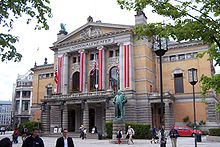National Theater





National Theater is the name of various theaters as an institution or building.
Originally, the National Theater was a stage with the task of promoting local plays in the national language and with a “national character”. The national theater was supposed to overcome the division of the stages into court theater and popular theater since the 18th century . The language community , for which the theater created a common framework, should be more important than class .
origin
Originally, the word was primarily used to identify the language on the stage. The “National Theaters” founded at the end of the 18th century did not claim to serve as state theaters for the entire German nation. Rather, the renunciation of the Italian opera and French drama common in courtly circles should be represented in the name.
In this sense, the Vienna Hofburgtheater became the Teutsches Nationaltheater next to the castle from 1776 (founded by Emperor Joseph II , after whose death the national language orientation was abandoned), the Mannheimer Theater from 1779 the Court and National Theater , the Theater am Gendarmenmarkt in Berlin since December 5, 1786 called the Royal National Theater . A Hamburg national theater was founded in 1767 by Lessing and 12 Hamburg citizens, but was closed again in 1768.
The idea of the National Theater was also connected with the intention of permanently engaging permanent ensembles , instead of renting the theater space to changing traveling troupes from year to year , as was still customary in some cases until the middle of the 19th century. With these improved production conditions it was hoped in the German-speaking area to free themselves from the dominance of the French repertoire. Richard Wagner stated in 1850 that "with very few exceptions, including only the first opera theaters in Italy, there are no original theaters than the Parisians, and all the rest are only copies of these".
German language area
The following theaters in Germany bear the name National Theater:
- National Theater Mannheim
- National Theater Munich (venue of the Bavarian State Opera and the State Ballet )
- German National Theater Weimar
Historically, the following theaters in the German-speaking area bore the name:
- Schauspielhaus Berlin , formerly the Royal National Theater
- Rose Theater Berlin, founded as Ostend Theater , was called the National Theater from 1892–1896
- Frankfurt National Theater , was named 1782 to 1841
- Hamburgische Entreprise , the first attempt at a German national theater
- Burgtheater in Vienna, formerly the German National Theater next to the castle
Worldwide
The national theaters around the world mostly owe their names to their status as state theaters or to the special importance they are given in the cultural life of a nation or language community.
Examples in Europe
- Albania: Teatri Kombëtar in Tirana
- Bulgaria: Naroden Teatar in Sofia, National Teatr in Varna
- Finland: Suomen Kansallisteatteri in Helsinki
- France: Théâtre national , the name or part of the name of various theaters in Paris and other major cities
- United Kingdom: Royal National Theater , London
- Greece: National Theater (Athens)
- Ireland: Abbey Theater - The National Theater of Ireland in Dublin
- Iceland: Þjóðleikhúsið in Reykjavík
- Croatia: The Croatian National Theater ( Hrvatsko Narodno Kazalište ) in Rijeka , Split , Varaždin and in Zagreb
- Latvia: Latvian National Theater in Riga
- Lithuania: Lithuanian National Drama Theater in Vilnius
- Luxembourg: Théâtre National in Luxembourg
- Norway: Nationaltheatret in Oslo
- Poland: Teatr Wielki - Opera Narodowa in Warsaw
- Portugal: Teatro Nacional D. Maria II in Lisbon, Teatro Nacional Sao João in Porto
- Romania: Teatrul Național in Bucharest, Cluj-Napoca, Dej, Drobeta Turnu Severin, Iași, Târgu Mureș, Timișoara
- Sweden: Kungliga Dramatiska Teatern in Stockholm
- Slovakia: Slovak National Theater in Bratislava
- Serbia: Belgrade National Theater in Belgrade
- Slovenia: Slovensko narodno gledalisce in Ljubljana
- Spain: Teatro nacional de Catalunya in Barcelona
- Czech Republic: Národní divadlo in Prague
- Ukraine: Ivan Franko National Drama Theater , Kiev
- Hungary: National Theater (Budapest) in Budapest
Examples in other continents

- Australia: National Theater in Melbourne
- Israel: Habimah in Tel Aviv
- Costa Rica: Teatro Nacional in San José
- Ghana: National Theater in Accra
- Japan: Kokuritsu Gekijo in Tokyo for traditional Japanese arts, Shin Kokuritsu Gekijo in Tokyo for Western arts, Kokuritsu Bunraku Gekijo in Osaka for Bunraku , Kokuritsu Gekijo Okinawa Urasoe for traditional Ryukyu arts, sometimes the Kokuritsu Nōgakudō for Noh in Tokyo
- Namibia: National Theater of Namibia , Windhoek
- Panama: Teatro Nacional in Panama City
- Syria: National Theater in Damascus
- Thailand: National Theater (Thailand) in Bangkok
- USA: National Theater in Washington, DC (privately owned theater)
- USA: Washington National Opera
Individual evidence
- ^ Richard Wagner: A theater in Zurich (1850)
- ↑ The Burgtheater is still known today as the “Austrian National Theater”. Cf. burgtheater.at: The Burgtheater ( memento of the original from April 1, 2016 in the Internet Archive ) Info: The archive link was automatically inserted and not yet checked. Please check the original and archive link according to the instructions and then remove this notice.
